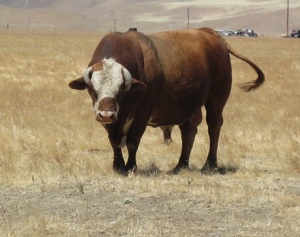
California’s ranchers could face a tougher economic future under climate change. The grasslands they depend on to feed their cattle could shrink by almost 40% by the end of the century, according to a study from Duke University and the Environmental Defense Fund.
The researchers modeled two different climate futures for California: a warmer, wetter scenario and a warmer, drier one. The study showed that by the end of the century, California’s shrublands could increase as much as 70% under the worst-case dry scenario, taking over historic grasslands and other ecosystems.
“This could put an additional economic burden on our ranching industry as ranchers would have to replace natural feed by purchasing hay,” says study author Rebecca Shaw of the Environmental Defense Fund. “We calculated that replacing lost forage caused by climate change with extra hay will hike costs for the California ranching industry by up to $235 million per year by 2070.”
Shaw says shrubs would have an ally in higher levels of carbon dioxide in the atmosphere, which could enhance their ability to withstand drought compared to grasses. A future with more frequent but lower-intensity fires could also help shrubs, since less intense fires wouldn’t wipe out trees and shrubs as often. That’s the model used in the study, but Shaw says “if climate change were to result in more frequent, higher intensity fires that killed shrubs and trees, rangelands have a better chance.”
[module align=”left” width=”half” type=”pull-quote”]“It’s going to potentially impact our entire ecosystem that we rely on for forage production.”[/module]
At a rangeland summit at UC Davis last week, Tim Koopman, first vice president of the California Cattlemen’s Association, agreed that climate change is becoming a reality for ranchers. “It’s going to potentially impact our entire ecosystem that we rely on for forage production. It’s certainly going to impact all the other natural resources that we’ve worked to steward for so many years.”
But Koopman says there may be a role for ranchers in mitigating climate change. The Cattlemen’s Association joined the California Rangeland Conservation Coalition and several environmental groups in sending a letter to the California Air Resources Board last year, asking them to develop a way for rangeland to be part of California’s upcoming carbon market. Ranchers would like to sell carbon credits for managing their land in a way that sequesters carbon and for the avoided development of their land.
“In general, I think ranchers have been skeptical of AB 32,” says Koopman. “But if it’s going to be implemented, I think the rancher and landowner community would be interested in participating. It’s potentially another revenue stream that may be able to offset climate change and other factors that may hurt us.”
Environmental groups are joining ranchers toward that end. “We don’t have to be victims of climate change,” says the EDF’s Shaw. “Ranchers can adopt practices that help to store more carbon in their rangelands which will reduce greenhouse gas emissions while making their soils more fertile.
“This allows ranchers to be part of the climate solution,” Shaw went on, “and to benefit from the California carbon market under AB 32. It’s important that we think about preventing rangeland conversion and help to keep ranchers ranching.”
